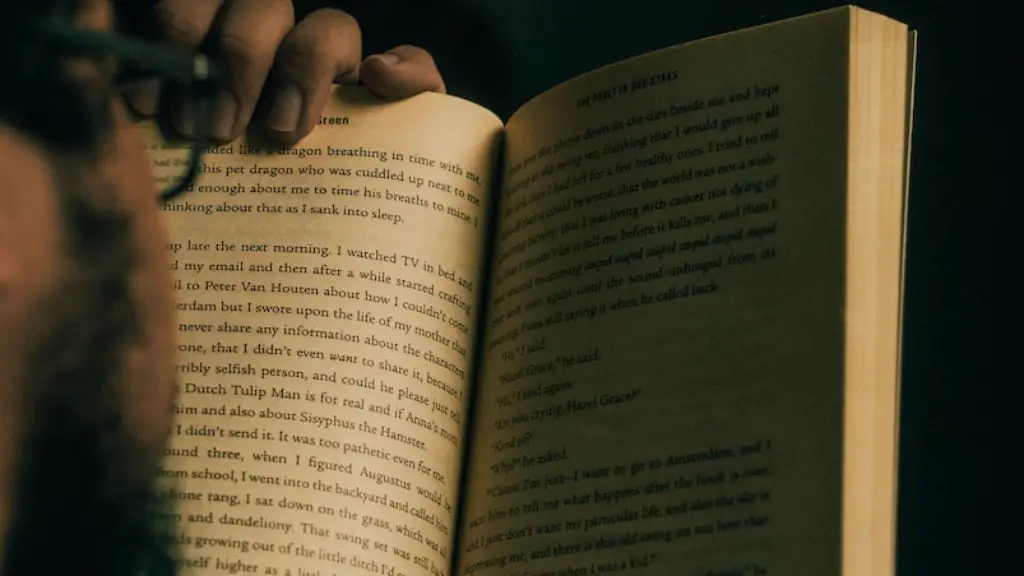Surrealism is a movement in visual, literary, cultural and philosophical arts that grew out of the European avant-garde in the early 1920s. It is based on the idea of the subconscious and is characterized by the exploration of dreams and its influence on the conscious world. Surrealist poetry is a form of writing in the vein of this philosophical and artistic movement. It is characterized by its use of unconventional visual imagery, dreamlike juxtapositions and the exploration of the subconscious.
Surrealist poetry is often referred to as the most experimental form of modern poetry. It relies on the power of visual art, its connection to the subconscious and its ability to explore the unknown. In surrealist poetry, language is used in a unique way to create surrealistic images, often deviating from its normal syntax and structure. The purpose of surrealist poetry is to make the reader feel a sense of confusion and/or awe. It works by juxtaposing seemingly unrelated images, symbols or phrases and using repetition in order to create meaning, while disrupting the reader’s logic.
Surrealist poets are often inspired by the writings of French philosopher Rene Descartes, who explored the limits of human understanding. Surrealist poetry takes this exploration a step further, often examining human existence and the idea of the human condition. Surrealist poets often use similes, metaphors and personification to create unpredictable images and phrases. The idea is for the reader to experience any emotion whatsoever, with the aim of “liberty of mind”, unconstrained by the rules and boundaries of traditional literature.
Surrealist poets often look to the past for inspiration. Their works are heavily influenced by traditional mythology, folk tales and religious texts, as well as by modern ideas and contemporary trends. By combining traditional mythology and folk tales with modern philosophical and aesthetic elements, surrealist poets create works of literature that are constantly evolving and are both meaningful and accessible. Additionally, surrealist poets use unconventional spellings, punctuation and syntax to disobey the conventions of traditional literature and create new dialogue that is both challenging and meaningful.
The influence of surrealist poetry is pervasive, as it has been a major source of inspiration for many of the best contemporary poets. It has also provided the language and framework for the expression of individual emotions and thoughts, as it allows for people to express their thoughts in a unique and powerful way. It has also proved to be an effective way of communicating ideas and divulging complex information in a succinct and interesting way.
The Impact of Surrealist Poetry
Surrealist poetry has had a profound impact on the world of literature, inspiring many authors to experiment with different aspects of poetry. Its influence can be seen in the writings of many authors throughout the modern and postmodern eras, including T. S. Eliot, W. H. Auden, and Sylvia Plath. These authors developed a powerful and innovative poetic style that was heavily influenced by surrealism. The surrealistic techniques used by these authors allowed them to express their own personal experiences, emotions, and perspectives in an unconventional and imaginative way that resonated with readers.
The Intersection of Surrealism and Politics
Surrealism has also been used as a tool for political and social commentary. In the 1920s and 1930s, surrealist writers and artists used their works to explore the complexities of human experience, power structures, and the impact of colonialism. In the 1960s and 1970s, surrealist works such as Julio Cortázar’s 1968 novel Hopscotch and Salvador Dalí’s 1971 painting The Persistence of Memory continued to challenge the norms of the time and deeply critique the existing political system. Today, surrealist poetry is still used as a method of expressing political and social views, often utilizing dreams and symbols to convey the writer’s opinions without explicitly stating them.
The Development of Surrealism
The development of surrealist poetry was a gradual process that began with the advent of modernism in the late 19th century. During this time, poets and authors such as T.S. Eliot, W.B. Yeats, and Ezra Pound sought to explore the unconscious and develop experimental ways of expressing their ideas and emotions in their work. Surrealist poetry emerged in the early 20th century, with André Breton’s publication of Surrealism and Painting in 1924. Since then, surrealist poetry has become a powerful form of literature and has had a major impact on the development of modern poetry.
The Relevance of Surrealism in Today’s Society
Surrealist poetry continues to be a major influence in the world of literature today. Its unique ability to explore the limits of human understanding and its potential for social and political critique make it an important tool for contemporary authors. Surrealist poets such as William Carlos Williams, Roberto Bolaño, and Anne Carson are important figures in the world of literature and are still creating works that make us think and look at the world in new ways. Additionally, surrealist techniques are still utilized by modern authors as a method of conveying complex ideas in an imaginative and accessible way.
Surrealism and the World of Art
Surrealist poetry has had a profound impact on the world of art as well. Visual artists such as Salvador Dalí, Rene Magritte and Giorgio de Chirico were greatly influenced by surrealism and used surrealistic imagery in their works. Additionally, surrealist ideas have been adapted and expanded upon by contemporary artists who challenge traditional notions of visual representation and explore the power of the unconscious. Surrealist ideas continue to have a great impact on the world of visual art, as they allow for artists to push the boundaries of what is possible in order to create works of art that are unique, experimental, and thought-provoking.
The Influence of Surrealism on Various Media
Surrealist authors and artists have had a major impact on many aspects of modern culture. In film, filmmakers such as David Lynch and Stanley Kubrick have been heavily influenced by surrealist techniques and themes. Additionally, surrealist ideas have been used by musicians such as Bjork, Radiohead, and The Flaming Lips to create music that is experimental, unpredictable and imaginative. Surrealism has also been an influence in the world of advertising, with many brands using surrealist techniques such as juxtaposition, symbolism, and dreamlike imagery to create engaging and compelling advertisements. Surrealism has had a major influence on the world of culture and is still an important tool for creative exploration, expression, and critique.


